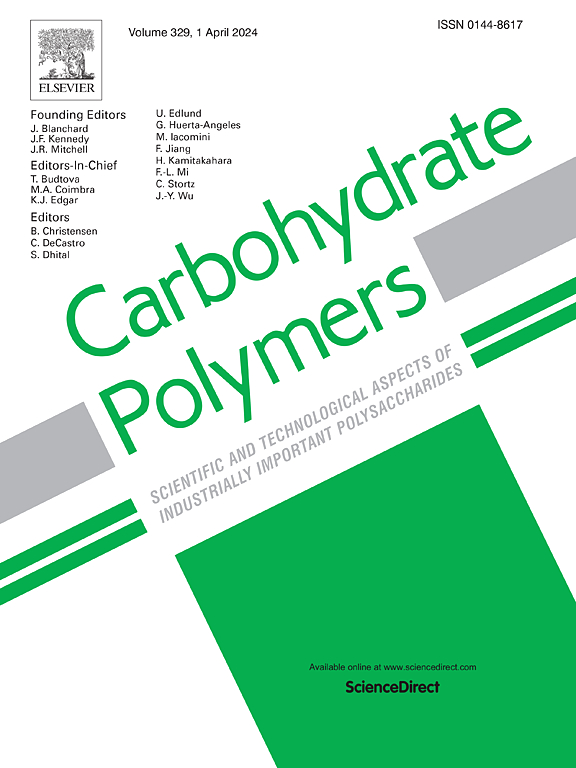淀粉-单宁酸复合物在调节肠道菌群产生丙酸的协同作用
IF 10.7
1区 化学
Q1 CHEMISTRY, APPLIED
引用次数: 0
摘要
淀粉-单宁酸复合物是一种抗性淀粉,但这些具有不同淀粉链长度分布(CLDs)的复合物对肠道菌群的影响尚不清楚。因此,以5种不同CLDs的商品淀粉为原料制备淀粉-单宁酸配合物,并利用人粪便微生物群体外发酵,探讨其对肠道菌群的影响。结果首次表明,小麦和玉米淀粉-单宁酸配合物显著促进丙酸产量(p <;0.05),比它们的逆行淀粉含量高88%。这可能与淀粉-单宁酸配合物诱导的不同菌群组成有关,如Segatella、Eubacterium_rectale_ATCC_33656和CAG-352的数量均显著减少(p <;0.05),丰度与丙酸产量呈负相关。值得注意的是,淀粉-单宁酸配合物的DP范围为12 <;DP≤24与Segatella的数量呈负相关,表明复合物的CLD是通过调节某些细菌来决定SCFA产量的关键因素。总的来说,这些结果强调了应用淀粉-单宁酸复合物靶向某些肠道细菌和scfa生产的可能性,最终改善人类健康。本文章由计算机程序翻译,如有差异,请以英文原文为准。

Synergistic impact of starch-tannic acid complex in regulating gut microbiota to produce propionate
Starch-tannic acid complex is a type of resistant starch, while the influence of these complexes with different starch chain-length distributions (CLDs) on gut microbiota is unclear. Therefore, starch-tannic acid complexes were prepared from five commercial starches with diverse CLDs, and their influence on the gut microbiota was explored using in vitro fermentation with human fecal microbiota. For the first time, results showed that wheat and corn starch-tannic acid complexes significantly promoted propionate production (p < 0.05) by up to 88 % compared to their retrograded starch counterparts. This was possibly related to the distinct microbiota composition induced by starch-tannic acid complexes, e.g., the amount of Segatella, Eubacterium_rectale_ATCC_33656, and CAG-352 was all significantly decreased (p < 0.05), while their abundances were negatively correlated with propionate production. Notably, starch-tannic acid complexes with a DP range of 12 < DP ≤ 24 were negatively correlated with the amount of Segatella, suggesting that the CLD of complexes is a crucial factor in determining SCFA production via regulating certain bacteria. Collectively, these results highlight the possibility of applying starch-tannic acid complex to target certain gut bacteria and SCFAs production, ultimately improving human health.
求助全文
通过发布文献求助,成功后即可免费获取论文全文。
去求助
来源期刊

Carbohydrate Polymers
化学-高分子科学
CiteScore
22.40
自引率
8.00%
发文量
1286
审稿时长
47 days
期刊介绍:
Carbohydrate Polymers stands as a prominent journal in the glycoscience field, dedicated to exploring and harnessing the potential of polysaccharides with applications spanning bioenergy, bioplastics, biomaterials, biorefining, chemistry, drug delivery, food, health, nanotechnology, packaging, paper, pharmaceuticals, medicine, oil recovery, textiles, tissue engineering, wood, and various aspects of glycoscience.
The journal emphasizes the central role of well-characterized carbohydrate polymers, highlighting their significance as the primary focus rather than a peripheral topic. Each paper must prominently feature at least one named carbohydrate polymer, evident in both citation and title, with a commitment to innovative research that advances scientific knowledge.
 求助内容:
求助内容: 应助结果提醒方式:
应助结果提醒方式:


